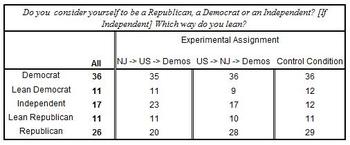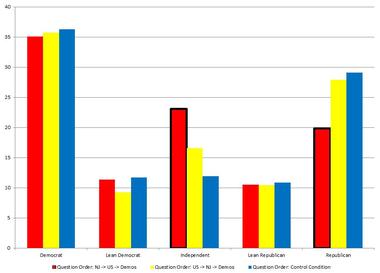Surveys from around the country have shown exactly how unpopular last month's government shutdown was, and that the public has tended to blame Republicans in Congress more than Democrats for that shutdown. However, it wasn't clear how much damage the shutdown has done to the Republican Party. After all, Republican Chris Christie in New Jersey cruised to reelection and, in Virginia, the Republican candidate for governor, Ken Cuccinelli, had problems more of his own making than any driven by national trends. So, as the thinking goes, if the shutdown did not hurt Republican candidates now, it can't be that bad for Republicans. However, the results of a new study show that disapproval of Congressional Republicans could have devastating effects for Republican candidates.
Focusing on how the handling of the shutdown affected, or did not affect, the vote this week ignores a more potent way in which it is impacting Republicans: making voters less likely to be Republicans in the first place. Most pollsters regard party identification - whether voters are Republicans, Democrats, or independents - as a fixed characteristic, like race or age. In fact, in most surveys, questions about party identification are asked at the end of the interview along with questions about gender, race, and age. But unlike race, age, or marital status, there's no static reality underlying party identification: someone can identify as a Democrat one day and an independent the next. So, it's possible for voters to change their party identification in response to political events of the day. Thus, if the shutdown has done real damage to the Republican Party, we'd expect that it would lead to fewer voters identifying as Republican.
To test this, we set up an experiment in our most recent poll of New Jersey voters leading up to the Election Day choice between Republican Chris Christie and Democratic challenger Barbara Buono. In it, voters were randomly assigned to one of three groups. In the first group, voters were first asked questions about New Jersey politics - approval of Christie, whether the state is moving in the right direction or not - then questions about how the various national players (President Obama, Democrats in Congress, Republicans in Congress) handled the budget negotiations. Immediately after these national questions, voters were asked about their party identification. In the second group, voters were first asked about the national budget negotiations, and then they were asked about New Jersey politics, and then their party identification. In the final group - the control - voters were all asked the same questions as those in the other groups, but answered an intervening series of questions about local farms and produce before being asked their party identification.
Question order:
Group 1. New Jersey politics... national politics... party ID
Group 2. national politics... New Jersey politics... party ID
Group 3. ....local farms and produce....party ID
In the control condition, in which voters weren't thinking about anything especially political because they are thinking about local farms, 29 percent said they are Republicans, and another 11 percent reported that they lean towards the Republican Party.
Since 61 percent of New Jersey voters approve of the way Christie is handling his job as governor, we might expect that asking voters about Christie and state politics just before the party identification question would increase the share of Republicans, but it doesn't. Among voters primed with questions about Christie and state politics, rather than a non-political topic, 28 percent reported they were Republican, and 10 percent that they lean to Republicans, same as the control group.
The big change occurred when voters were asked about the national budget shutdown just before being asked their party identification. In this case, the share of Republicans dropped from 29 percent to 20 percent, while those who said they are independent jumped 11 points, from 12 percent to 23 percent.
In short, this is potentially a huge problem for Republicans. The same survey showed only 14 percent approve of the job Republicans in Congress are doing on the budget. If voters were thinking about Republicans in Congress, Republicans lost one-third of their base.
At the same time, results also suggest that the national Republican confrontation over the budget had little impact on the Republican Christie. Most voters who were reminded of the national budget impasse were not more or less likely to approve of Christie. However, Democrats primed the same way were more likely to say that they "don't know" how they feel about the Republican incumbent. Reminding Democratic voters of national Republican policy did not turn more Democrats against Christie, but it did make them more uncomfortable saying that they approve of him. Christie, a well-known quantity in the Garden State, was insulated from the negative effects that Congressional Republicans were having on the electorate, but other Republicans running without their own brand may not be so lucky.
These findings are important for two reasons. First, they show how much damage the fight over the government shutdown may do to Republicans, not just in New Jersey but nationwide. If the shutdown fights continue - and there are indications that they will - Republicans will continue doing well among their base, but their base will be much smaller. Second, the results are a caution to pollsters everywhere: partisanship measures do get pushed around by the questions asked beforehand. Some polls - though not the best ones - use party ID to weight their data. So, if the questions in a survey influence party ID, then weighting by party ID will further distort their results.

